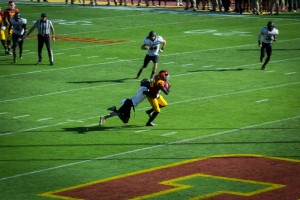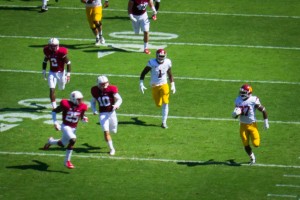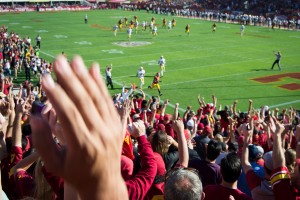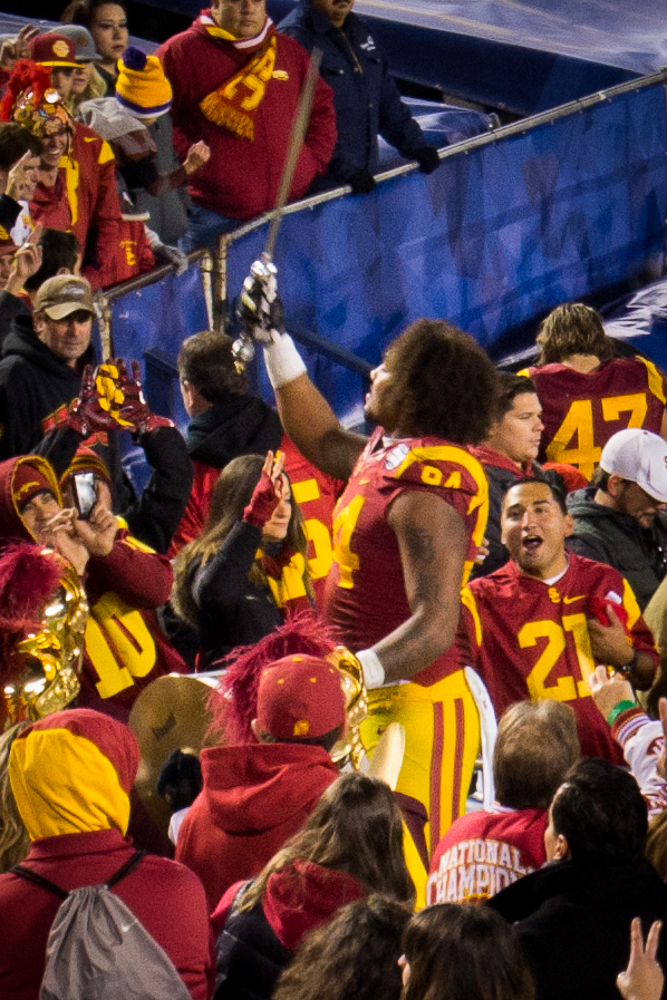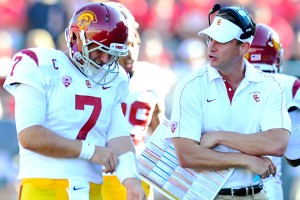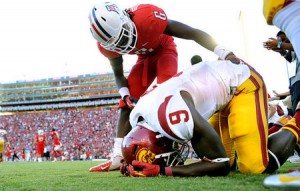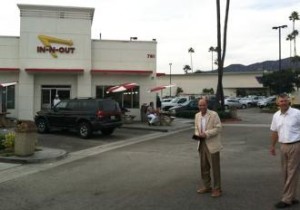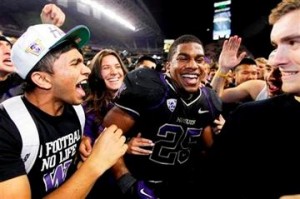With Monday’s College Football Championship game marking the end of the 2014 season, last week I began to look back at some of the content I produced for USCFootball.com, the Scout Network website dedicated to wall-to-wall coverage of USC Trojans football. I’ve done in-season work for the site since 2000, through its three iterations: starting out as an independent start-up; transitioning to become part of the Rivals Network; and, just prior to this season, joining Scout.
This one’s for my loyal football content readers — especially the stat and result geeks. So, be forewarned!
If you’re a reader, you know that — for the 14th consecutive season — I produced my annual Pac-12 preview where I pick a winner and a score for each game played by a conference school, prior to the season. This year’s preview can be found here: 2014 Pac-12 “Picking the Winners” Game-by-Game Preview.
In 2014, I picked winners in 67 of the 92 Pac-12 games played (including Oregon’s win in the Pac-12 Championship game; I had them beating USC, rather than Arizona but it’s crazy what one completed Hail Mary can mean). That 67-25 mark means I predicted 72.8 percent of the games correctly, slightly off from the combined total of my prior 13 seasons: 74.6 percent. It represented a much steeper drop from 2013, when I posted my second-best season ever (81.3 percent), but was still far better than 2012 — my worst season to date (64.1 percent).
Digging into the numbers, I found some intriguing notes and trends:
- My four best records in selecting specific teams’ games included: Oregon (12-1); UCLA (10-2); Colorado (10-2); and Washington (10-3). In a way, you can kind of throw out UO and CU. I picked Oregon to win all 13, so their one loss (to Arizona) was, unsurprisingly, my only incorrect pick. Thanks Ducks! At the other end, I had Colorado winning four total games and one conference game. Turns out, they simply just lost two of the games I picked them to win to fade to a rough 2-10, 0-9 finish. The success with the Bruins and UW was a little more noteworthy. First, the Huskies: I selected their first seven games correctly before a loss to Arizona State ended that run. Two weeks later, UW lost at UCLA — one of my two incorrect Bruin choices. Finally, in August, I thought the Huskies might struggle in the Apple Cup at Pullman — but that was before Wazzu lost quarterback Connor Halliday against USC and limped to a tough finish. Before the season, I picked UW to finish the regular season at 9-4, 5-4; they finished 8-5, 4-5. Aside from the aforementioned defeat of Washington, my only other UCLA error was when the Bruins were shocked at home by Utah. That 10-2 mark — with one incorrect pick on each side of the docket — meant that my prediction for a 9-3, 6-3 UCLA regular season was dead on.
- The only team that I whiffed on more than I got right in my preseason picks? Utah (5-7). Suffice it to say, I did not believe in the Utes prior to the season’s kickoff. I had them finishing 3-9, 1-8 and tied for last in the Pac-12 South with Colorado. Instead, Utah finished the regular season with an 8-4, 5-4 mark and impressive late wins at UCLA and at home against USC.
- There was only one other conference team for which I didn’t pick a correct result in either seven or eight contests: Cal (9-3). The Golden Bears bounced back in a big way from a dismal 2013, falling just short of bowl eligibility at 5-7, 3-6 — including tough, close losses at Arizona (49-45 on a game-ending Hail Mary) and at home to UCLA (36-34) and BYU (42-35, in the closing game of the regular season). I picked against Cal in all three, helping my overall success.
- The 8-4s and 7-5s. As for the rest of my picks, here’s how it broke down by team: Arizona (8-4); Oregon State (8-4); Stanford (8-4); USC (8-4);
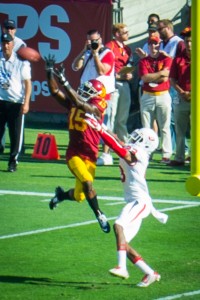
Nelson Agholor for 6. USC’s win over Fresno State was one of eight Trojan games picked correctly in my Pac-12 preview.
Arizona State (7-5); and Washington State (7-5). Among those teams’ overall records, I whiffed pretty clearly on Arizona (picked 6-6, 3-6; they finished 10-2, 7-2 prior to the championship game and bowl season), Stanford (picked 11-1, 8-1; finished 7-5, 5-4) and Washington State (picked 7-5, 4-5; finished 3-9, 2-7).
- Eight best single game picks of 2014
- Sept. 6: I picked Oregon over Michigan State by 17 — 38-21. The final margin: 19, in a 46-27 victory.
- Sept. 13: I picked Arizona State over Colorado, 38-24. The actual final score? Yep, 38-24.
- Sept. 27: I picked Cal to beat Colorado by a field goal in overtime (37-34). The result? A higher scoring game with the same outcome: Cal by a field goal in OT, 59-56.
- Sept. 27: I picked Stanford to edge Washington, 20-16, just off from the real result: Stanford 20, Washington 13.
- Sept. 27 (good week, huh?): I selected USC to defeat Oregon State by 22 (45-23). The Trojans won by 25 (35-10).
- Sept. 27 (yep, again): I picked Washington State over Utah by three (38-35). The Cougs won, 28-27. Suffice it to say, with how both teams’ seasons went — and my acumen in picking them — this might be the most shocking of the “best” picks listed.
- Oct. 11: Oregon beat UCLA, 42-30, in Pasadena. Prior to the season, I’d selected the Ducks as 44-35 victors.
- Oct. 11: I selected Stanford to beat Washington State by 17 (41-24). The Cardinal did, in fact, beat the Cougars by 17 (34-17)
- Eight worst single game picks of 2014
- Sept. 20: Yep, I underestimated Utah — and probably gave good old Brady Hoke a tad too much credit. The pick: Michigan 35-23. The reality: Utah 26-10 — a 28-point differential.
- Oct. 2: I lost one Oregon game all season — and it was a doozy. I picked the Ducks by 30 over Arizona, making the Wildcats’ 31-24 win my third worst point differential this season: 37. Guess I should have saved the 30-point win call for the conference title game.
- Oct. 4: My miscalculation of the Cougars’ progress under Mike Leach resonated in a big way when Cal upended Wazzu 60-59. My preseason pick: Washington State, 52-24. Ugh.
- Oct. 4 (yes, this weekend was the payback for the great Sept. 27): One of my two incorrect UCLA picks was almost as rough as that Oregon miscue above. I picked the Bruins to top Utah by 31. But the Utes had other ideas, winning 30-28.
- Oct. 25: By the time this game happened, the outcome wasn’t much of a surprise. But, since I’d picked the Cougs (again) to beat Arizona by six, the Wildcats’ 22-point drubbing lands on this list.
- Nov. 1: The pick: Oregon State 51, Cal 27. The reality: Cal 45, Oregon State 31. That’s right, this game’s No. 2 on my worst point differential chart at 38.
- Nov. 15: Stanford looked to be a solid choice against the Utes prior to the season — as did many others. About a 31-point pick. So, of course, the Utes won by 3 in double OT.
- Nov. 22: Saving the worst for last in a couple of ways! One of the few times I actually picked the Utes prior to the season — by a touchdown over Arizona — what do they do? How about go out and lose at home, 42-10? Sure, why not! Utah was my kryptonite in 2014, even when I picked them to win. In this one, they were responsible for my single worst point differential of the season: 39.
***
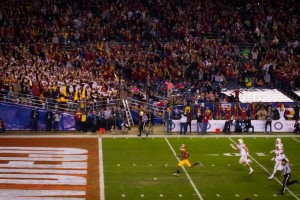
Adoree Jackson was still a blur, even to my best camera and lens, on his receiving TD in the Holiday Bowl.
Additionally, I handle USCFootball.com‘s official weekly game and opponent previews throughout the season. The Trojans survived the final season of sanction-hampered personnel, finishing with a 9-4 mark (6-3 in the Pac-12 South, good for a second-place tie) — including big road wins at Stanford and Arizona, as well as a dominant victory over rival Notre Dame and a Holiday Bowl win over a game Nebraska squad in a thriller. “A thriller” became perhaps too familiar a description for many USC fans in 2014. Not only did USC hold off Stanford, Arizona and Nebraska in the final moments, but they were also victimized by those “thrills,” losing twice in the waning seconds — at home, on a final-play Hail Mary against Arizona State and at Utah on a Utes drive that was capped by a one-yard TD pass with eight seconds to play.
Those losses plus a truly baffling and unacceptable upset loss at Boston College in week three and a throttling at the hands of crosstown rival UCLA kept the Trojans’ season from being a “total success,” as contended by Coach Steve Sarkisian. However, given USC’s dwindling number of available scholarship players throughout the season, there is hope for the future as the Trojans begin to restock with their first full scholarship class since 2011 set to sign on Feb. 4. And if you believe what you’re reading on USCFootball.com, that class could be something else.
Here are links to each of my USC game previews for 2014:
August 30: (15) USC vs. Fresno State
September 6: (14) USC @ (13/10) Stanford
September 13: (9/10) USC @ Boston College
September 27: (18/22) USC vs. Oregon State
October 4: (16/20) USC vs. (24) Arizona State
October 11: USC @ (10/13) Arizona
October 18: (22/25) USC vs. Colorado
October 25: (20/21) USC @ (19) Utah
November 1: USC @Washington State
November 13: USC vs. California
November 22: (19/24) USC @ (9/11) UCLA
November 29: USC vs. Notre Dame
December 27: (24) USC vs. (25) Nebraska, Holiday Bowl, San Diego
Taking a look at my record with the picks in these week-by-week previews, I finished with eight correct and five incorrect — about right considering the Trojans’ topsy-turvy season.
Let’s take a look at the misses:
- I wasn’t alone in thinking the then-No. 9 Trojans would roll at Boston College. That game is still one of the more baffling I’ve attended. USC jumped to a 17-6 lead and looked on its way to the expected blowout before just falling completely flat for about 35 minutes. Ugly.
- Up next, USC’s embarrassing Hail Mary loss to ASU. Nuff said.
- The following week, after such a ridiculous defeat, I picked Arizona to beat the Trojans in Tucson. The Wildcats were coming off their big win at Oregon and I expected the momentum on both teams’ sidelines — plus the home field — would be enough for Arizona to come out on top. I will tell you, a small courtyard condo complex in Cambridge, Mass., got an unexpected 1:45 a.m. wake-up call when Cats kicker Casey Skowron shanked an easy game-winning field goal attempt, giving the Trojans the win. I was staying there after attending a wedding in Boston the day before, and I kinda forgot my surroundings (and the reality of the Eastern time zone) for a minute.
- USC gave a game to Utah. My kryptonite, I tell ya.
- And, though I smartly picked the Bruins in my Pac-12 preview, I went with my heart in the game-week preview, picking the Trojans to win in Pasadena. Bad call.
The best two picks in the weekly previews: USC by four at Stanford (the Trojans won by 3); and the Trojans by 22 over Colorado (USC won by 28).
The worst two picks in these previews: Obviously, BC (34-point differential) and UCLA (24-point differential).
My closest calls on USC total points in weekly previews: 35 vs. Oregon State (exactly right, as USC scored 35); 42 at Washington State (44); 31 at Arizona (28); 24 at Utah (21).
My closest calls on USC points allowed in weekly previews: 30 vs. Cal (exactly right, as the Bears posted 30); 17 vs. Fresno State (13); and 19 at Utah (24).
One last intriguing note: in 2014, the Trojans averaged 35.8 points per game and allowed 25.2 points per game. My score predictions, when averaged out, weren’t far off — USC 36.7, opponents 24.4 — essentially giving the Trojans about a point of extra credit in either direction.
***
If you’re one of my football content readers, thanks for spending your time on my stories. I hope you’re looking forward to the 2015 season as much as I am. In the meantime, here’s one last prediction for this season:
Oregon 46, Ohio State 37

